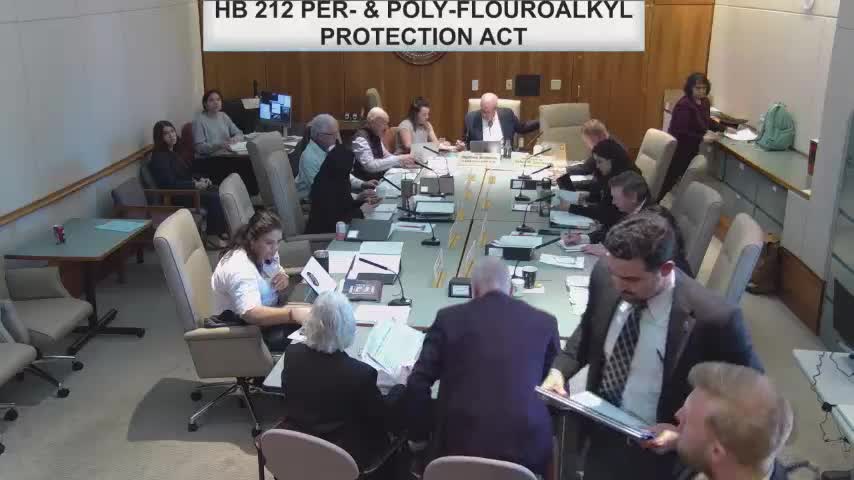Committee approves bill authorizing strategic forest‑to‑community buffer funding to reduce wildfire risk
February 08, 2025 | Energy, Environment & Natural Resources, House of Representatives, Committees, Legislative, New Mexico
This article was created by AI summarizing key points discussed. AI makes mistakes, so for full details and context, please refer to the video of the full meeting. Please report any errors so we can fix them. Report an error »

Representative James D'Antonio presented House Bill 175, an amendment to the Forest and Watershed Restoration Act to explicitly authorize creation and maintenance of strategic Wildland‑Urban Interface (WUI) buffer zones and to allow the Forest Land Protection Revolving Fund to finance those projects.
The sponsor said buffer projects slow wildfire spread into communities, create defensible space for fire operations and can help suppress fires before they reach structures. He described recent wildfires that severely damaged Ruidoso and other communities and said the bill will authorize the forestry division and fund administrators to consider buffer projects and other preventative landscape measures as eligible projects under the revolving fund.
Tribal and local officials — including Mescalero Apache Tribe representatives and Lincoln County lobbyists — supported the bill. The Mescalero witness emphasized tribal experience running proactive forest and watershed programs and urged state funding and coordination. PNM’s representative said the bill fit utility vegetation‑management strategies and suggested a narrow drafting amendment to ensure utility infrastructure could be included in eligible project language.
The bill lists definitions, eligible activities and clarifies the rotation of funds in the existing Forest Land Protection Revolving Fund. Sponsor materials said the fund already receives about $2,000,000 in recurring revenue and that authorizing buffer projects would re‑target existing money rather than require a large new appropriation. D'Antonio also provided committee members an attorney general memorandum on the anti‑donation doctrine; the AG opinion supplied by the sponsor concluded the statute as structured would be a permissible public‑benefit program rather than an unconstitutional donation of government funds to private parties.
Committee members asked about landowner consent, tribal sovereignty, timber management and local contracting. The deputy state forester described coordination procedures and conservation priorities. Members also expressed interest in aligning buffer projects with local workforce development and Tribal forest enterprise opportunities.
The committee voted unanimously (recorded 6–0 in attendance) to advance the bill. Sponsors said they would work with PNM and local and tribal partners on any drafting adjustments the utility had proposed and would continue stakeholder outreach.
Ending: The committee advanced HB175 and requested the forestry division and sponsor provide follow‑up draft language addressing minor drafting suggestions from utilities and additional details on landowner engagement and workforce integration.
The sponsor said buffer projects slow wildfire spread into communities, create defensible space for fire operations and can help suppress fires before they reach structures. He described recent wildfires that severely damaged Ruidoso and other communities and said the bill will authorize the forestry division and fund administrators to consider buffer projects and other preventative landscape measures as eligible projects under the revolving fund.
Tribal and local officials — including Mescalero Apache Tribe representatives and Lincoln County lobbyists — supported the bill. The Mescalero witness emphasized tribal experience running proactive forest and watershed programs and urged state funding and coordination. PNM’s representative said the bill fit utility vegetation‑management strategies and suggested a narrow drafting amendment to ensure utility infrastructure could be included in eligible project language.
The bill lists definitions, eligible activities and clarifies the rotation of funds in the existing Forest Land Protection Revolving Fund. Sponsor materials said the fund already receives about $2,000,000 in recurring revenue and that authorizing buffer projects would re‑target existing money rather than require a large new appropriation. D'Antonio also provided committee members an attorney general memorandum on the anti‑donation doctrine; the AG opinion supplied by the sponsor concluded the statute as structured would be a permissible public‑benefit program rather than an unconstitutional donation of government funds to private parties.
Committee members asked about landowner consent, tribal sovereignty, timber management and local contracting. The deputy state forester described coordination procedures and conservation priorities. Members also expressed interest in aligning buffer projects with local workforce development and Tribal forest enterprise opportunities.
The committee voted unanimously (recorded 6–0 in attendance) to advance the bill. Sponsors said they would work with PNM and local and tribal partners on any drafting adjustments the utility had proposed and would continue stakeholder outreach.
Ending: The committee advanced HB175 and requested the forestry division and sponsor provide follow‑up draft language addressing minor drafting suggestions from utilities and additional details on landowner engagement and workforce integration.
View the Full Meeting & All Its Details
This article offers just a summary. Unlock complete video, transcripts, and insights as a Founder Member.
✓
Watch full, unedited meeting videos
✓
Search every word spoken in unlimited transcripts
✓
AI summaries & real-time alerts (all government levels)
✓
Permanent access to expanding government content
30-day money-back guarantee

